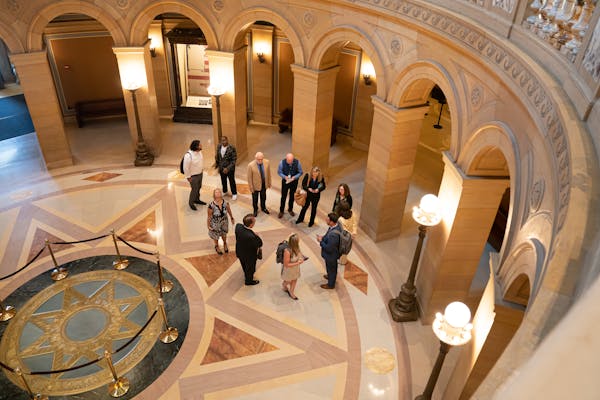The Minnesota Legislature will return to the Capitol for a special session on Monday as lawmakers race against a July 1 deadline to finalize the details of a two-year, $52 billion state budget and avert a government shutdown.
Gov. Tim Walz and leaders in Minnesota's divided Legislature expressed confidence Friday that they will hit that deadline — possibly with some time to spare — despite lingering differences on policing in Minnesota, voting rights and environmental policies.
With the clock ticking, leaders say unsolvable ideological differences will need to be set aside to pass a budget in time that helps the state recover from the toll of the pandemic.
"The essence of the deal is financial and the policy battles fall away, for the most part," said House Speaker Melissa Hortman, DFL-Brooklyn Park. "Being one of the only states in the country with divided government, there are certain policy ideas that Republicans and Democrats hold dear that just aren't possible."
Walz issued a proclamation on Friday calling lawmakers back to St. Paul on Monday. He will also then extend the emergency powers he's used to respond to the pandemic for another 30 days.
The move was expected after weeks of behind-the-scenes negotiations to fill in the details of a broad budget agreement struck by leaders on the final day of the regular session on May 17. Those negotiations were slated to continue all weekend in the lead-up to lawmakers' return on Monday.
Legislative committee chairs and state agency commissioners are working to resolve sticking points in key areas of the state budget, including education funding. Republicans held two news conferences this week to push for a program that would allow families to put money in an education savings account to pay for private school tuition.
"We really think that education savings account is a small provision that allows parents and their students more opportunities for success. We think it would be particularly helpful in Minneapolis and St. Paul," said Senate Majority Leader Paul Gazelka, R-East Gull Lake. "That's one thing we've been fighting for."
Democrats want the budget to cover inflationary costs for schools into the next two-year budget, to which Republicans haven't agreed. The two parties are also clashing on election reforms, including a push from the Senate to require a photo ID to vote and to implement a system where provisional ballots are used if there are questions about a voter's eligibility.
Republicans want Walz to delay new vehicle emissions rules for at least two years, but Walz hasn't agreed to a delay.
"These are incredibly ... important, philosophical conversations that happen, but then we get to the point on some of them and say, 'This is going to have to be fixed another day,' " Walz said Friday. "What we need to do now is build the roads, fund the schools, return some [money] if we're capable. We've got some good tax cuts in there for Minnesotans. We'll get it done."
Despite their differences, both sides have said there's no issue they're willing to shut down state government over, which would happen automatically if they don't pass a budget before July 1, when the new fiscal year begins.
"In the end, with the only divided Legislature in the entire country, it's never enough that either side will get," Gazelka said. "For some people that's extremely frustrating, but it is a reality of divided government."
The special session still could last nearly two weeks. The budget bills take several days to process, and disagreements with House Republicans over a handful of issues could mean delayed and long debates.
Republican House Minority Leader Kurt Daudt, R-Crown, blasted Walz in a statement this week over another extension of his emergency powers, which Republicans in the Legislature have voted to end. Daudt said they will continue to push to end the powers next week.
"The 'emergency' in Minnesota has been over for months," Daudt said. "This has gone on long enough, and House Republicans will do everything in our power to end the emergency powers before the special session adjourns."
Things could look closer to normal on Monday. The Capitol building reopened to the public this week after being closed for 440 days. The Legislature, which has operated remotely for nearly two sessions, will have more people on the House floor during votes, Hortman said.
Many committee hearings will still take place over Zoom.
Staff writer Jeremy Olson contributed to this report.
Briana Bierschbach • 651-925-5042
Twitter: @bbierschbach
Former DFL Senate Majority Leader Kari Dziedzic dies of cancer at age 62

How the Star Tribune is covering the 2024 election

Fact check: Walz and Vance made questionable claims during only VP debate

In Tim Walz's home city, opposing groups watch him debate on the national stage

